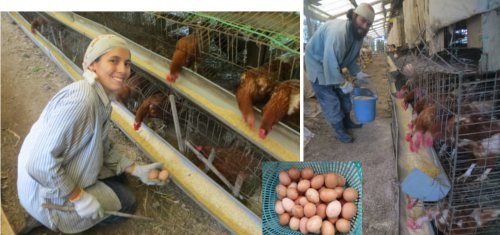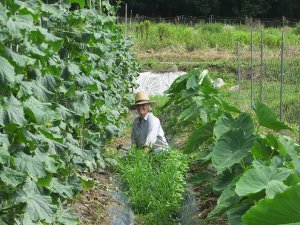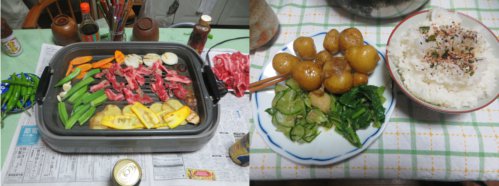WWOOFing in Ichijima

Since July 13, 2013, we were WWOOFing for 6 days at an organic farm in the town of Ichijima, Kansai region, Japan. For the last 25 years, this farm has been the daily project of Shinjin and Keiko, a couple with a great commitment towards the environment. While working at their farm, we were able to learn from them about organic agriculture, meditation, yoga, and Japanese cuisine, history, and culture. We shared this experience with Nagayama (Farm Intern), Kenishi, and Chika (other WWOOFers from Japan and United States respectively). The farm is part of Ichijima Organic Agriculture Association, a Community Supported Agriculture (CSA) organization which is comprised of three organic farms that serve consumers on a weekly basis.
Community Supported Agriculture (CSA) is a model based on the direct relationship between consumers and farmers without intermediaries, this system is also being used in many other countries around the world. Consumers and farmers are in agreement over the vegetables that are grown during the year and they maintain communication regarding the quality and prices of the products as well as their mutual needs.


In the specific case of the Ichijima Organic Agriculture Association, the three farms grow, pack, and distribute boxes of organic vegetables three times per week (Tuesdays, Thursdays, and Saturdays) for 300 consumers in the Kansai region. The boxes are delivered to a place selected by the consumers, which is usually close to their homes. Some consumers order a box as a group and share the organic products on a weekly basis.
CSA is based on the concept of Sharing the Harvest, which not only promotes the direct relationship between farmers and consumers but also amongst neighbors in their communities, especially those living in urban settings where social isolation is very often a problem. Most of what we pay for our food goes to companies that transport, process, and market what comes off the farm, not to farmers themselves. The people who actually grow food and do the hardest job don’t get paid enough to keep doing it. The majority of people today don’t know where or how their food is grown. This system bypasses the supermarket, the middle people, and the international transportation system, which in turn provides consumers fresh local products in season and at reasonable prices. If we hope to eat healthy food, we need to keep farmers in business.
Our WWOOFing experience in Ichijima was very structured: we worked six hours per day segmented in three periods to take advantage of the most comfortable hours during the summer. Since we started WWOOFing last year, this has been our first experience working at a farm with this magnitude of production and we were very excited to learn about organic agriculture at a greater scale. Furthermore, Shinjin shared with us his knowledge and experience in yoga and meditation, two practices he discovered many years ago in India during a trip that changed his life forever. He went from planning to be a businessman to becoming a farmer. In Ichijima, we started the day by practicing meditation at 5:20 am. This was our first experience with meditation, an art we have been curious about for a long time and we hope with practice we can get better at keeping our mind clear of thoughts while sitting on our numb legs.
After meditation, we began our first farming shift from 6 am to 8 am with the tasks of harvesting okra, feeding 300 chickens, collecting an average of 150 eggs per day, and gathering soil from the chickens’ rooms for future compost production. When we took care of the chickens for the first time, two of them got out of their coup and were trying to run away. We will probably always laugh at the memory of Sal chasing those two fast fugitive chickens! Around 8 am, we went back home to enjoy a delicious breakfast and we both fell in love with Keiko’s unique and refreshing frozen tomato smoothie.


From 9 am to 11 am, we returned to our farming and completed different tasks which usually included weeding, harvesting, and preparing the soil for planting. The happiness we feel when we learn where the vegetables we eat grow from and discovering new ones is indescribable. Through the days we harvested okra, tomatoes, eggplants, green onions, and green beans. At about 11 am we enjoyed a daily session of yoga, a pleasant way to reward and stretch our bodies after enduring difficult positions while weeding or harvesting under the sun.
We gathered together at the table for lunch and enjoyed Keiko’s Japanese cooking, often consisting of sticky white rice or noodles in combination with a variety of flavors, meats, and fresh organic vegetables which added to the excitement of group conversations in English and Japanese. After lunch we took a recess to recharge our batteries before starting the last farming shift at 3pm.

Around 5 pm, we were free to indulge ourselves by taking a refreshing shower, washing off the sweat and dirt that came from working with nature. We rejoined together at about 7 pm for dinner which usually extended into pleasant conversations before bed time. Working half the time of what most farmers in Japan do daily (12 hours per day), gave us a glance of the multiple skills and knowledge needed in agriculture, but more than anything, a deep sense of respect and appreciation for farming jobs. Growing food is a demanding and essential labor that isn’t recognized or paid enough in our society. More than ever, we feel thankful towards farmers all over the world for devoting their lives, families, dreams, and efforts to ensure that every day we have something to enjoy on the table.
Shinjin was always eager to teach us about the science behind organic farming. We were very impressed by the permaculture system of his farm as they promote cycles of organic harmony and self-sufficiency. The rice fields and the chickens are perfect examples of cycles. Shinjin explained to us that having ducks in the rice fields is an organic strategy to maintain them because the animals help with the weeding and fertilization of the soil. Raising chickens organically by feeding them grass (coming from farm weeding and harvest of vegetables), yogurt, organic corn mix, and crushed oyster shells (to strengthen egg shells) is also a very important part in the life cycle at the farm. Naturally, chickens love digging in the soil, mixing their dung and left-over grass, which in combination with microorganisms like Bokashi and EM- 1, promote the production of compost that can be used in the preparation of soil for planting vegetables. Shinjin made clear the chemistry concepts that guide the preparation of soil for organic farming. We learned the difference between compost and fertilizer: compost is what is used to make the soil better for planting by increasing its level of carbon and fertilizer are the nutrients given to the crops to increase their level of hydrogen. Our recollection of our school biology classes became revived as we remembered that a plant needs oxygen, carbon, and hydrogen to make photosynthesis. When a plant has a yellowish color, it can be an indicator of its low level of chlorophyll and magnesium. Magnesium is very important for the plant because it allows the absorption of carbon, oxygen, and hydrogen. Calcium is also a very important element, necessary to strengthen the walls of the plant and fruit, which protect it from insects, bacteria, and other plagues. By working in the farm, Shinjin thought us in practice the different elements from nature that can be used to create compost and fertilizers. Many of these important elements can be recycled from the organic leftovers of the farm itself or other natural sources. For example, crushed chicken eggshells or crushed oyster shells can be added to the compost to increase levels of calcium in the soil.
Having the opportunity to live with a Japanese family in Ichijima, was a great way of learning about their culture and history. Shinjin introduced us to the three major religions and philosophies in Japan: Shintoism, Buddhism, and Confucianism. Shintoism is the oldest and only original one from Japan, while Buddism and Confucianism like many other cultural aspects in this country were imported from China. When we commented about the high level of respect towards others that we observed in Japanese behavior, Shinjin explained that Confucianism is the major philosophy behind people’s values in the country which is based on the importance of family and respect towards the elder and other people in general. Shinjin, Keiko, and other WWOOFers seem happy to chat with us and interested in learning about the realities of our countries as well. Shinjin, who is originally from Hiroshima, was open to share with us the way in which World War II and the atomic bombs, dropped by the United States, directly affected the health of his father, his community, and the future of Japan. Over time, many people exposed to radiation developed heart conditions, and cancer. In addition, their life expectancy has become significantly shorter. After being defeated by the United States, Japanese economy and culture became highly Americanized. When we asked Shinjin if people in Japan were resentful towards the US for attacking and destroying their country? He explained that Japanese people usually focus on moving forward and they avoid keeping attachment to negative incidents and thoughts from the past. He also told us that after US intervention in Japan, the land that was only own by few rich people was redistributed, which in his opinion was a positive outcome of the war. Shinjin also shared with us his concerns about Japan entering the Trans-Pacific Strategic Economic Partnership (TPP), an agreement of free trade with the United States and other countries. He explained that based on his visits to the US, he knows Japan’s farming isn’t in the conditions to compete against the industrialized farms in the US, where everything is operated with machines and productions are at mass scale. Shinjin is also concerned about the health risk of importing genetically modified products as these are frequently produced and sold without labels in the US. Politics and social issues became recurrent topics of conversation amongst us as we were all eager to see and understand from each other’s perspectives what has been happening all over the world. During the times of the civil war in El Salvador, Shinjin was very informed and concern about their situation. He expressed with joy that having the opportunity to meet us was his chance to learn more about the current situation of the country. With his experience of living in Brazil as an international student, Shinjin was very in tune to many aspects of life in Latin America. The flavors of South American food were also a recurrent topic of remembrance.
While WWOOFing in Ichijima, we were able to learn about Community Supportive Agriculture, a community-based model for organic farming that allows consumers like us to play an active and responsible role in the crucial need of sharing the harvest. It is time for all of us, ordinary citizens and consumers, to do some research and find an existing CSA in our communities! In addition, working at the farm and living with a Japanese family allowed us to be in touch not only with many important aspects of agriculture, but also with the culture, history, and cuisine of Japan. Once again, we feel fortunate for the chance to be traveling and meeting amazing people, which are constantly rewarding us with their kindness and knowledge. Poetically enough, Shinjin planted in us the gifts of yoga and meditation that he discovered many years ago in India, and we left in his hands the seeds that Raju, the farmer at our previous WWOOFing experience in India, gave us to plant somewhere else around the world. A cycle closes, another begins, the journey continues… 🙂
